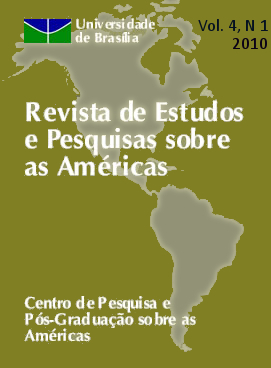Estado, Império, Tahuantinsuyu: uma reflexão sobre modelos racionais-legais de organização política e possíveis bases da legitimidade do império inca
Abstract
O presente artigo trata dos conceitos de estado, império e legitimidade, comparando o modelo racional-legal de estados nacionais europeus e conceitos gerais de império à organização política dos incas (Tahuantinsuyu). O Tahuantinsuyu é descrito à luz das interpretações da historiadora Susan Ramírez, e o modelo geral de estado nacional europeu e o conceito de império são descritos por meio das propostas de Charles Tilly, Max Weber, Hardt e Negri e teorias políticas modernas. O conceito de legitimidade é a referência central que permeia a reflexão sobre os dois fenômenos, além de outras categorias weberianas em menor intensidade, como patriarcalismo. A partir destas reflexões, discute-se questões fundamentais que tangenciam estado e legitimidade, como hierarquia, relações de poder, motivações de obediência e o papel político dos meios de violência.
Downloads
Downloads
Published
How to Cite
Issue
Section
License
The published material is the property of the Journal, and may be reproduced in whole or in part with indication of the source.
Copyright: Authors will be responsible for obtaining the copyright of the material used. Authors who publish in this journal agree to the following terms:
a)Authors retain the copyright and grant the journal the right of first publication, with the work simultaneously licensed under
the Creative Commons Attribution License which allows the sharing of work with acknowledgment of authorship and initial publication in this journal.
b) Authors are authorized to take additional contracts separately, for non-exclusive distribution of the version of the work published in this journal (eg, publish in institutional repository or as a book chapter), with acknowledgment of authorship and initial publication in this journal.
c) Authors are allowed and encouraged to publish and distribute their work online (eg in institutional repositories or on their personal page) at any point before or during the editorial process, as this can generate productive changes as well as increase the impact and the citation of the published work (See The Effect of Free Access).
















